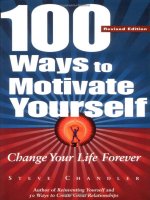Feeling good 100 ways to feel better every day phần 3 pptx
Bạn đang xem bản rút gọn của tài liệu. Xem và tải ngay bản đầy đủ của tài liệu tại đây (82.79 KB, 12 trang )
Know how much you’re eating.
Americans eat larger food portions than nearly any
culture in the world. One key to losing weight and
keeping it off is to eat sensible portions. Are you
aware of how much you’re eating?
• A typical 4-ounce bagel is equal to 4 Pyramid servings.
Most adults should eat a total of 6 to 11 servings a
day of bread and other grain foods (see the bottom of
the Pyramid). So one bagel comprises nearly half your
daily intake of grains, according to the modified
Pyramid guidelines, which call for less bread and
grains in our diet. Think about how you can change
your habits. For example, instead of a whole bagel, try
eating half a bagel and some fresh fruit.
• A medium order of French fries is equal to 4 Pyramid
servings. Again, that’s nearly half your grains for the
day. Skip the French fries, or order the smallest size.
27
Lose weight if you know you need to.
Obesity is reaching such epidemic proportions that
the U.S. Surgeon General considers it the nation’s
number one health concern. Nearly two-thirds of
American adults and 13 percent of children are
overweight or obese. Adults and children who are
overweight are at an increased risk for some types of
cancer, type 2 diabetes, heart disease, arthritis, and
other diseases.
If you need to lose weight, talk with your doctor
about the right weight management program for you.
Then commit to losing the weight you need to lose—
through a diet program that includes portion control,
exercise, and the support and incentives you need to
stick with it.
28
Become a defensive eater.
Walter C. Willett, M.D., professor of medicine at the
Harvard Medical School, offers this advice in his book
Eat, Drink, and Be Healthy: “Practice defensive eating
strategies.” Here’s how, according to Dr. Willett:
• Practice stopping before you are stuffed.
• Be selective. Don’t eat things just because they are put
in front of you.
• Spoil your appetite. Have a low-calorie healthy snack
such as carrot or celery sticks before eating a meal.
• Try keeping it simple. Avoid all-you-can-eat buffets
and stick with simple, well-balanced meals.
29
Make healthy choices when dining out.
Dining out at a restaurant doesn’t have to mean
unhealthy eating.
• Share a meal with someone else or bring half your
meal home to eat the next day. Typical restaurant
servings are often twice the size of a single serving.
• Send the breadbasket back.
• Avoid fried foods.
• At fast food restaurants, order a grilled chicken
sandwich and put the fixings on yourself. Choose
low-fat condiments.
• Drink water instead of soda.
Tip: Value meals aren’t such a great deal when you
consider the calories and fat you’re consuming.
30
Boost your energy.
Exercise and a proper diet are the best energy
boosters.
• Never skip breakfast. A good balanced breakfast
boosts your energy all morning long.
• Get exercise. Being active is the best way to boost
and maintain energy.
• Limit how much alcohol you drink. It depletes
your energy.
• Avoid overeating. Big meals leave you feeling sluggish.
• Have light snacks throughout the day. Frequent small
meals and snacks help you maintain a constant energy
supply. Choose healthy foods that give you energy,
such as fruits, nuts, and yogurt. Avoid candy bars,
potato chips, and other foods that are low in nutrients
and high in calories.
31
Listen to music and relax.
It’s no accident that music is a feature of all human
cultures. Music can entertain us, distract us from
our worries, stimulate our brains, and help us relax.
Figure out the music that relaxes you and use it to
reduce anxiety.
• Listen to music on the way home after a long day.
• Assemble your own “feel good” music collection and
play it when you need a lift or distraction.
• Expand your music horizons by borrowing music
CDs and tapes from your local library or by searching
and sampling the legitimate online music services.
• Make your own music. Sing or play an instrument.
• Be considerate. Music that makes you relax may be
annoying to others.
32
Take a nap.
More than 50 percent of Americans are sleep
deprived. Lack of sufficient sleep is also a widespread
problem among teenagers. A study conducted by the
National Institute of Mental Health suggests that a
quick, refreshing “power nap” can do wonders for
your mental and physical health. The study found
that napping for 20-30 minutes can reduce stress and
leave you feeling refreshed. Napping for longer than
that, however, can spoil your regular sleep cycle and
habits. So don’t overdo it!
Nearly one in five adults report making occasional or
frequent work errors due to sleepiness.
–The National Sleep Foundation
33
Be good to your feet.
More than 43.1 million Americans—one in every six
people—have trouble with their feet, mostly from
shoes that don’t fit properly, according to the American
Academy of Orthopaedic Surgeons. Here are some tips
from the AAOS to help prevent foot problems:
• Have your feet measured every time you buy new
shoes. Your foot size increases as you get older.
• Women should not wear a shoe with a heel higher
than 2 1/4 inches.
• There should be a 1/2-inch space from the end of
your longest toe to the end of the shoe. If the shoes
feel too tight, don’t buy them.
Because a child’s feet are constantly growing, it is
important to allow at least one finger’s width from the
end of the longest toe when buying shoes.
–American Academy of Podiatric Sports Medicine
34
Get help if you have a hearing problem.
Hearing loss is fairly common, especially after age 50.
One in three people over the age of 65 have hearing
loss. Signs of hearing loss include having trouble
hearing clearly, having trouble hearing on the phone,
and needing to turn up the volume of the radio or TV
to hear. To take a quick, written hearing health test, go
to www.audiology.org/consumer/guides/hhqt.php on the
Web site of the American Academy of Audiology.
Talk with your doctor if you have difficulty hearing.
Most hearing difficulties can be helped with a full
evaluation by an ear specialist and prescribed
treatments and aids.
35
Get support if you are a caregiver.
Caring for an older or dependent relative or loved one
is emotionally and physically exhausting. That’s why
it’s important to seek support for yourself.
• Remember that you don’t have to do it alone. Ask for
help from family and friends.
• Get help from a support group. Support groups are a
place to share stories, feelings, and information with
others who are going through what you’re going
through. Talk with your doctor, your EAP, or your
employee resource program to find a support group in
your community.
• Talk about how you are feeling with the people you
love. Give yourself permission to feel what you’re
feeling. Let others offer comfort and be there for you.
36
Look at something beautiful.
The simple act of pausing in your hectic day and
looking at something beautiful can improve your
outlook and make you feel good.
• Put a picture of someone you love in your work area.
• Take a moment to watch the sunset.
• Put a vase of flowers in your work area.
• Hang a favorite print or painting where you’ll enjoy
it each day.
37
Take care of yourself if you work nights.
People who work evening and night shifts suffer
higher rates of health problems and sleep disorders
than does the general population, according to a new
study by Circadian Technologies, Inc. It’s especially
important to take care of yourself if you work nights.
• Pack healthy snacks and meals and avoid fast food
and unhealthy vending machine snacks.
• Get regular exercise. It helps you sleep better.
• Relax for an hour or so before getting into bed. Take
a warm bath or shower to relax.
• Turn off the telephone while you are sleeping and
darken the room.
According to the Bureau of Labor Statistics, approximately
24 million Americans work outside the hours of 7 a.m.
and 7 p.m.
38









